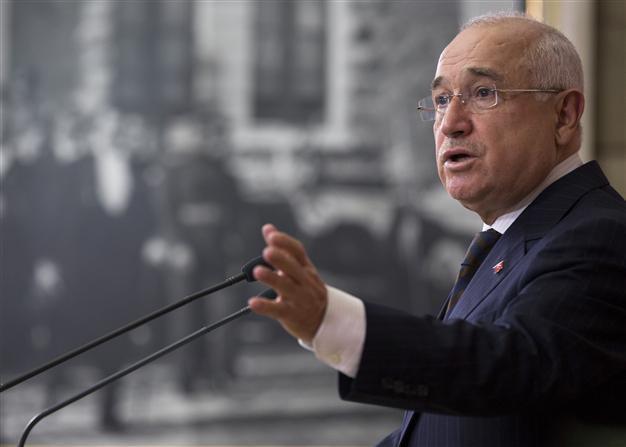Parliamentary speaker urges ‘normalization’ of Turkey
ANKARA

Parliamentary Speaker Cemil Çiçek gave an exclusive interview to the Hürriyet Daily News on March 26.
“Turkey will lose, if politics are not normalized right after the elections,” Parliamentary Speaker Cemil Çiçek told the Hürriyet Daily News on March 26.During an exclusive interview three days ahead of the critical local elections on March 30, Çiçek said it was also needed because the locals would be the first of a series of elections in the near future. “We have presidential elections in August and people have already started to speculate on having the parliamentary elections in June 2015 earlier, perhaps this year. That is another reason that we have to become normalized as soon as possible starting from the morning of March 31,” he said.
Çiçek sees the Dec. 17, 2013, graft probe as the main reason of the anomalies in Turkish politics right now. “Nobody is talking about the urbanization projects or municipal projections,” he explains. “The whole election campaign has been based on corruption allegations on the opposition side and the ‘parallel structure’ on the government’s side,” using Prime Minister Tayyip Erdoğan’s expression for the public servant sympathizers of Fethullah Gülen, the U.S.-resident moderate Islamist scholar who used to be Erdoğan’s close ally, but now is almost an arch enemy.
He has just started to work on the formation of an Investigation Commission on the allegations about four former ministers, whose names are involved in the graft probe due to the mandate given by the extraordinary parliamentary session on March 19. A commission has to be formed before April 30.
“A lot of mistakes have been made,” Çiçek says, “I have observed this in my official contacts abroad. My counterparts used to ask me questions about Turkey’s successes, now they are asking questions about our problems. From March 31 on, everyone should have self-criticism. If criticizing is a right in democracies, self-criticism is a responsibility.”
Despite escalating antagonism, both between Gülenists and Erdoğan, Erdoğan and opposition the parties on the corruption allegations, Çiçek thinks the recipe for ”normalization” is not so complicated. It consists of two items:
1- Politics should be carried out over the rule of law; rules should not be violated by politicians who actually set them at the first place.
2- The judicial, legislative and executive branches of the government should not interfere with each other’s fields; everyone should mind their own business.
That may be easy to say, but not that easy to do. PM Erdoğan has already said a number of times that he is not comfortable with bold lines between the executive and judicial branches and wants more power for the executive. In a recent move, right after the graft probe, Erdoğan managed to pass a law from Parliament increasing political influence on judges and prosecutors, saying the “parallel structure” took advantage of the loopholes to gain influence in the judiciary. And more power to the executive branch, especially to the president, might come up during the presidential elections in August.
“My job is to say what is needed and what is right within the law,” Çiçek said. “I do not want to focus on any individual politician. What we need is an immediate normalization; that is all I know.”











